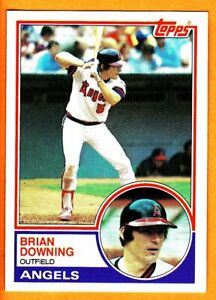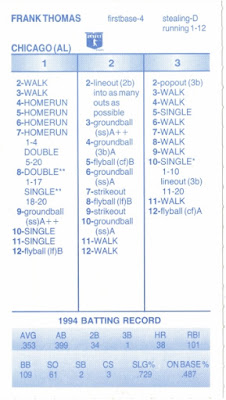Setting the lineup for the top-seeded 1997 Orioles, I have to say that I was impressed: good power, solid starting rotation, strong defense, and an outstanding bullpen. Not surprisingly, they won 98 games and I had forgotten that they won the AL East that season, losing out on a pennant in the ALCS. They faced the 73-81 1958 A’s, who had a core of recognizable players like Maris, Cerv, Lopez, Terry, Daley–mainly because they all ended up on the ‘61 Yankees. The A’s started swingman Ray Herbert (8-8, 3.50) as their best shot against Mike Mussina (15-8, 3.20), who was 6th in the AL Cy Young voting that season. The game starts dubiously for the A’s in the top of the 1st when leadoff hitter Bob Martyn triples, the O’s bring the infield in to fend off scoring by the limited KC offense, and that works perfectly as Martyn is nailed at home on a Preston Ward grounder. Things go better for them in the 2nd, as Hector Lopez finds Mussina’s HR result for a 2-run shot put KC ahead, while the O’s keep hitting into rally-killing DPs. In the 4th, Baltimore loses DH Geronimo Berroa to injury, although they have a seemingly endless supply of candidates to replace him. Bob Cerv leads off the 5th by also finding and converting Mussina’s 5-9 HR, but the Orioles finally respond in the bottom of the inning with a Mike Bordick sac fly and a clutch 2-out RBI single from Roberto Alomar, and the A’s lead is cut to 3-2. When Mussina walks Bill Tuttle with one out in the 6th, I think about pulling him, but leave him in just long enough for Martyn to find that 5-9 roll again, and it’s now 5-2 and closer Randy Myers is called in desperation. That doesn’t solve the problem, as in the 8th Martyn doubles DeMaestri home–putting Martyn one single short of a cycle–and Ward nails a single off Myers’ card that scores Martyn and the A’s lead expands. The onslaught doesn’t stop there, and Myers is pulled for Arthur Rhodes, but he allows a few more baserunners and by the time Tuttle makes his second out of the inning to finally end it, the A’s lead 9-2. The A’s batting around in the 8th provides Martyn with an at-bat in the 9th, and he seizes the opportunity with a base hit, completing his cycle which I believe is the first in the history of the tournament! Herbert dispatches the Orioles in the 9th and the #1 seed is crushed by the #7 seeded A’s, 9-2.
According to ELO rankings, the 1927 Red Sox had the distinction of being among the 20 worst teams of all time, and after playing the terrible 1930 version of the team last regional it was hard to imagine this team being even worse. But they were, going 51-103, with a team ERA of 4.79 and an offense that hit fewer than half the home runs provided by Babe Ruth that season. They faced the 2006 Nationals, who may have lost 91 games but looked great by comparison, except for the near-total lack of starting pitching. The Nats best option was spot starter Mike O’Connor (3-8, 4.80) while the Red Sox were at least able to send out their lone Hall of Famer, Red Ruffing (5-13, 4.67) albeit hardly in one of his better years. Washington loses C Brian Schneider to injury in the 3rd, but both pitchers are in control until the 6th, when Nats RF-2 Austin Kearns misplays a Jack Tobin single that sets up a sac fly by Bill Regan for a 1-0 Boston lead. A Jack Rothrock double in the 6th chases O’Connor for Nats closer Chad Cordero, but he yields a single to Phil Todt and the Red Sox extend their lead. However, in the bottom of the 8th Kearns walks and Alfonso Soriano finally solves Ruffing, taking him deep for a 2-run shot that ties the game; a rattled Ruffing then walks three batters but whiffs PH Alex Escobar to keep the game knotted. Neither team can score in the 9th so we head to extra innings, and both Cordero and Ruffing expend their final inning of eligibility keeping things tied after 10. In the top of the 11th, new Nats reliever John Patterson is greeted by a Fred Haney grounder that Nats 2B-3 Jose Vidro can’t get to; Haney steals second on injury replacement C Brandon Harper and then Jack Tobin doubles in Haney to put the Red Sox on top. That means Boston has to turn to its non-existent bullpen to try to hold the fort in the bottom of the inning, so Jack Russell of terrier fame is given the task. Russell does the job, with 2B-3 Regan turning a game-ending DP, and the underdog Red Sox move on to the semifinals with the extra-inning 3-2 win.
The 1983 Phillies won the NL pennant with a 90-72 record, although as noted earlier the ELO ranks thought that there were six teams better than them that season. Still, the team had some weapons in Schmidt and Morgan (although Pete Rose was a waste of cardboard, as he often was towards the end of his career), as well as solid fielding and three good starters, with John Denny (19-6, 2.37) getting the first round nod. They faced a steroid-era 2000 Rangers squad juiced with players like Rafael Palmiero, although they lost 91 games as they had some serious defensive holes and their pitching was largely dreadful, with Rick Helling (16-13, 4.48) being by far their best option. The Rangers squander back to back doubles from Rusty Greer and Pudge Rodriquez in the top of the 1st, as Denny strands them both, although Gary Matthews’ leadoff double in the bottom of the inning produces the same lack of results. However, a Mike Lamb 2-out double in the top of the 2nd does result in a run, and then Frank Catalanotto singles in Lamb to give the Rangers a 2-0 lead. The rash of doubles continues in the bottom of the inning, with two-baggers from Garry Maddox and Sixto Lezcano narrowing the margin to 2-1, and then a 2-run shot by Joe Lefebvre off Helling’s card gives the Phils a 3-2 edge. Sarge Matthews connects for a solo shot off his own card in the 5th and the lead is 4-2. A Gabe Kapler single in the 8th makes the Phils eye their bullpen, but they decide to stick with their ace and Denny comes through, retiring the side without incident. The Phils thus enter the 9th with a two run lead and their full complement of defensive replacements in, but Denny doesn’t need them as the Rangers go down in order and the “Wheeze Kids” limp on with a 4-2 win, with Denny scattering seven hits.
The 2001 Blue Jays were a pretty mediocre bunch, going 80-82 with uneven offense and defense, and their best starter was a 24-year-old named Roy Halladay (5-3, 3.16) who seemed to deserve more innings than he’d been getting to this point in his career. They faced the hot off the Strat-press 1947 Reds, who would have been noticeably worse than their mediocre 73-81 record if not for the efforts of Ewell Blackwell (22-8, 2.47), the NL MVP runner-up that season. Both teams start off the game looking offensively inept, getting runners on but unable to convert, with Jays 3B Felipe Lopez grounding into a DP in the 4th while getting injured being one example. The teams keep stumbling through innings; Shannon Stewart leads off the 8th missing a HR 1-4/DO, but Blackwell bears down and strands him at second. That seems to galvanize the Reds into a two out rally, as Grady Hatton doubles in Bert Haas (off Halladay’s card) and Eddie Miller singles Hatton home to give Blackwell a two run pad going into the top of the 9th with three defensive replacements coming in for additional insurance. Blackwell gets two quick outs, but then I discover a 4th defensive switch I should have made, as Alex Gonzalez hits a grounder to Reds 1B-4 Babe Young. But Young casually scoops the ball, steps on first, and it’s game over with the Reds heading to the semifinals with a 2-0 win, courtesy of the 6-hit gem by Blackwell.
The survivors
Two bad teams that pulled off upsets in the first round get to vie for a berth in the regional finals as the #8 seeded 1927 Red Sox play host to the #7 seed 1958 A’s. The starters were Ralph Terry (11-13, 4.24) for the A’s against Boston’s Slim Harriss (14-21, 4.17), which didn’t instill much confidence on either side. In the bottom of the 2nd, the Red Sox manage to hit five X-Chart results, all of which were manned by “4” fielders on the A’s, and the results aren’t pretty as Boston takes a 2-0 lead on the resulting hits. The Red Sox add another in the 4th when Grover Hartley triples off Terry’s card, and Jack Rothrock singles him home for his second RBI of the game and a 3-0 lead. Another KC 2-base error in the 7th sets up a Jack Tobin RBI single and Boston adds to their advantage. Meanwhile, Harriss is cruising and keeps the A’s off the scoreboard until two are out in the 9th; at that point Hal Smith converts a HR 1-5 for a solo shot, but Harriss gets the next batter and the underdog Red Sox take the 4-1 win and will make an unexpected visit to the regional finals.
This semifinal matched the pennant-winning, #2 seeded 1983 Phillies against the #5 seed 1947 Reds, featuring two veteran pitchers of considerable repute, with neither of them in one of their better seasons: 39 year old Steve Carlton (15-16, 3.11) against double no-hit Johnny Vander Meer (9-14, 4.40). The Reds rattle Carlton early with two walks and a sharp Eddie Miller single giving Cincinnati a 1-0 lead in the bottom of the 1st, but Sixto Lezcano promptly nails a solo shot in the 2nd to tie it up. In the top of the 3rd, Joe Morgan comes to the plate, and the dice come up 1-12, and I look to his card nervously wondering what I would find there, but lo and behold, it’s a solid HR and the Phils lead 2-1. Things then stay tight until the 8th, when Ivan Dejesus raps a clutch 2-out single and Schmidt takes off for home (1-16 with two out)--but he’s nailed and it remains a one run game. It thus comes down to the bottom of the 9th; PH Ray Mueller gets a hit to lead off, but Carlton retires a second PH Bobby Adams and there is one out and the top of the order is up. Frankie Baumholtz draws a walk, and 1-16 Tommy Tatum comes in to pinch run at second. The Phils debate long and hard, and ultimately decide that their veteran starter is done for, and summon Al Holland from the pen to try to preserve the game. Augie Galan grounds out, advancing the runners, so it's 2 away, tying run on 3rd, winning run on 2nd, and the Reds best hitter, Grady Hatton, is at the plate. Here’s the pitch: 6-7, it’s in Holland’s killer 6 column and mighty Grady has struck out. The Phils squeak their way into the finals with a 2-1 win and the Reds’ effort to become the second straight brand-new 1947 season regional champion falls short.



















